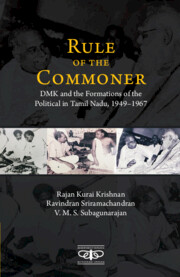6 - Critical Hermeneutics
Published online by Cambridge University Press: 15 June 2022
Summary
If every key text authored by Annadurai in the 1940sthat functioned as ammunition for the ideologicalpropagation of the DMK at its inception wascontroversial in some sense, there is one text thatparticularly makes even his supporters feel awkwardto speak about. In drawing-room conversations inmiddle-class, educated households, the text iswhispered as Annadurai's all-time low. Hisdetractors always lay it against him as anexhibition of bad taste. This text, Kamparacam (Aṟiñar Aṇṇā2008b), is a critical albeit selective reading ofKamparāmāyaṇam.Kamban is the twelfth-century Tamil poet whorendered Valmiki's Ramayana in Tamil as Irāmavatāram (The RamaIncarnation). The text however is popularly known asKamparāmāyaṇam.Annadurai's Kamparacamis a close reading of some of the verses of the textwith explicit and “inappropriate sexual references”that a common reader feels embarrassed to speakabout. However, it is really surprising that in theseventy-five years since Annadurai wrote the text,no critical tradition has developed in Tamilscholarship to actually study what Annadurai triedto do as critical hermeneutics and how far his workcould be validated.
For the limited purposes of this chapter, we would liketo contextualize the work and a pamphlet thatpreceded it known as TīParavaṭṭum (Let the Fire Spread), acompilation of debates that Annadurai had withscholars on the question of whether Kamparāmāyaṇam should beburnt along with another twelfth-century Shaiviteclassic Periya Purāṇamas a program of spreading awareness among the peopleagainst Brahminical Hinduism (Annadurai 1995). Thecall to burn these two texts was given by theSelf-Respect Movement. Since Tamil scholars had cometo be aligned to the Self-Respect Movement from thedays of the first wave of anti-Hindi agitations in1938–1939, their objections to the burning of thetwo literary texts were engaged with in the mode ofpublic debates, a significant gesture in thestill-emerging public sphere. Though there were twotexts to be consigned to flames, what whollypreoccupied the debates was Kamparāmāyaṇam, which excited a sharpconflict in views particularly because of the highliterary value the text was accorded.
- Type
- Chapter
- Information
- Rule of the CommonerDMK and Formations of the Political in Tamil Nadu, 1949–1967, pp. 123 - 140Publisher: Cambridge University PressPrint publication year: 2022



